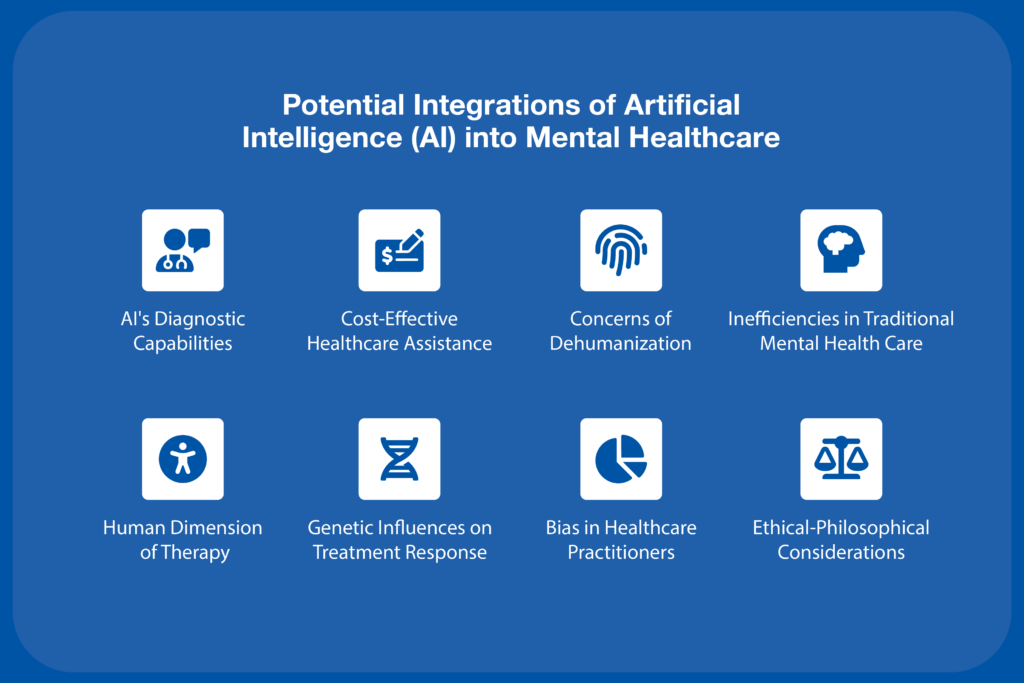
Background
In the article Is AI the Future of Mental Healthcare?, authors Francesca Minerva and Alberto Giubilini explore the potential integration of artificial intelligence (AI) into mental healthcare. The article explores and unpacks the following key findings:
- AI's Diagnostic Capabilities
- Cost-Effective Healthcare Assistance
- Concerns of Dehumanization
- Human Dimension of Therapy
- Inefficiencies in Traditional Mental Health Care
- Genetic Influences on Treatment Response
- Bias in Healthcare Practitioners
- Ethical-Philosophical Considerations
Shift in Placement Criteria
Minerva and Giubilini begin their exploration by highlighting AI's increasing role across various professional domains, including recent applications in education, the judicial system, and entertainment. The focus then shifts to healthcare, emphasizing AI's superior diagnostic capabilities due to its capacity to learn from extensive datasets and identify patterns, addressing the growing demand for cost-effective healthcare assistance.
While recognizing the benefits of AI in addressing mental health challenges, the article raises concerns about potential dehumanization if machines replace human practitioners, particularly in areas where empathy and trust are crucial. Despite AI's ability to excel in certain medical tasks, the authors argue that the human dimension of therapy, including empathy, may be irreplaceable, prompting ethical considerations regarding the balance between AI benefits and the preservation of essential human aspects in mental healthcare delivery.
Traditional Healthcare
The article continues by delving into the inefficiencies of traditional mental health care, citing instances where treatments, such as antidepressants, are marginally more effective than placebos. The authors propose that genetic differences influencing individuals' responses to antidepressants could be addressed by AI, which could match patients with the most effective therapy based on genetic information. AI's potential in predicting suicide attempts is also highlighted, showcasing higher accuracy compared to psychiatrists using large datasets and social media tracking.
The article underscores biases present in healthcare practitioners, suggesting that AI could provide impartial and objective diagnoses, although acknowledging AI's potential biases. Ethical-philosophical considerations are raised regarding the categorization of mental health disorders, questioning whether AI's fine-grained information might challenge or alter existing diagnostic categories. This prompts discussions about new responsibilities for mental health professionals in redefining mental disorder categories based on AI-generated data.
Conclusion
The conclusion that Minerva and Giubilini stress at the end of their findings is that the adoption of AI in mental healthcare requires careful consideration of empirical evidence regarding its benefits and drawbacks. Potential scenarios include AI significantly improving patient outcomes, proving useful but with notable downsides, collaborating with healthcare practitioners, or being less cost-effective than anticipated. The article underscores the need for ongoing evaluation based on evidence and outcomes and acknowledges the essential role of human involvement in healthcare.
Sources: https://www.ncbi.nlm.nih.gov/pmc/articles/PMC10230127/
Minerva F, Giubilini A. Is AI the Future of Mental Healthcare? Topoi (Dordr). 2023 May 31;42(3):1-9. doi: 10.1007/s11245-023-09932-3. Epub ahead of print. PMID: 37361723; PMCID: PMC10230127.

